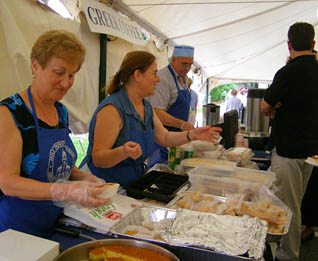 |
||
|
|
||
|
How Does One Grill Shishkebab for 10,000? (Answer: Watch Holy Trinity Chefs at Maine's Largest Greek Festival) by Mary Papoutsy Photos by Mary Papoutsy and Philip Lekousi Every year members of Portland's Holy Trinity Greek Orthodox Church begin preparations many months in advance of the state's largest ethnic festival. Committees meet to plan baking and work schedules. Members reserve tents and chairs from rental companies. And the ladies' guild of the church begins to bake its famous, home-made pastries. |
||
| Eating at the festival during the evening and listening to toe-tapping live music, it's easy for a patron to overlook the behind-the-scenes preparations and hard work for such an event. But without it, the festival would not be able to deliver its trademark fine food and pastries year after year. Spread largely by word of mouth and occasional brief clips on local television stations, the festival attendance has continued to grow steadily. So, what's the secret? How do these volunteers actually grill foods and bake pastries for ten's of thousands of patrons? |
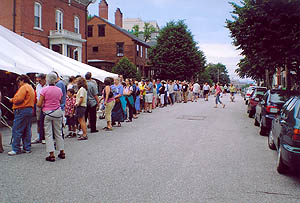 Lines of patrons testify to the popularity of the annual festival. (Photo by Philip Lekousi) |
|
| The secret, according to parish council president and festival chair, Greg Tselikis, is in the organization. Each year the festival committee meets and reviews operations for the previous festival and implements any necessary changes. But one of the best modifications made in recent years, when Tselikis assumed leadership of the annual event, is the delegation of many tasks so that the work is spread out evenly among volunteers. That way, the tall, amiable chairperson insists, the work doesn't fall on the shoulders of just a few people. His enthusiasm for the festival is catchy: shortly after we began talking, his brother, Steve, joined in the fun, followed by his wife. |
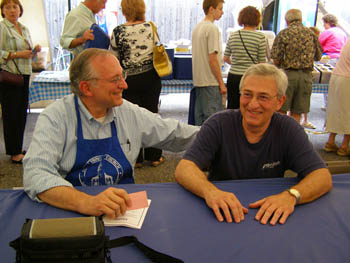 Parish president and festival chair Greg Tselikis (left) and his brother, Steve, the council's treasurer and festival volunteer. |
|
The festival, after all, is a family affair. Many of the current volunteers have been working for years, some of them first attending as youngsters, and later signing on as adults. Baking and cooking techniques demonstrated by community elders ensure success each year; pastry recipes are those handed down from generation to generation by grandparents and great-grandparents. But the organizational plan is a modern one, brought to the festival by children and grandchildren of the parish's founders. |
||
| Grilling the meat for the shishkebab is an art. Volunteers begin preparing the meat earlier in the week, cutting vegetables by hand and marinading the meats. More than 600 pounds of lamb were used for this year's three-day extravaganza. On the first day of the festival, trays of lamb skewered with vegetables and onions were grilled on two special grilling tables constructed just for the festival. Each rectangular grill holds about two dozen skewers, rotated periodically by hand, and cooked over live coals. The experienced chefs know just when to turn the pieces and just when to remove them from the heat. One of the festival's trademarks, however, is its recipe for the marinade. It includes olive oil, lemon and herbs. But exactly which herbs, the volunteers tease goodnaturedly, is a family secret! But if one wants to learn how to prepare the meat and grill it for optimal flavor, patrons can observe the easy techniques of the chefs at the festival. Many recipes for marinading Greek-style meats include olive oil, vinegar, garlic, and salt and pepper. Vinegar and garlic can be omitted, substituting lemon juice for vinegar or brushing on lemon juice just before grilling, according to other traditions. A few experts like "Kyra Vefa," author of an internationally acclaimed series of illustrated cookbooks, maintain that additional spices like cinnamon can also be added. |
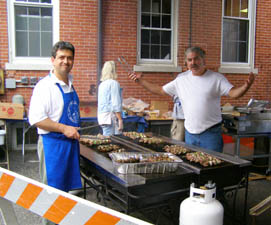 Master chefs Thanas Budri (left) and Paul Ureneck (right) prepare the tasty kebabs. 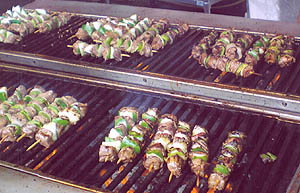 Chefs grilling shishkebab (top photo); skewered lamb and vegetable shishkebab (bottom photo, by Philip Lekousi) |
|
Members of the local Greek community point out that the shishkebab is best served in traditional Greek style. In other words, the meal should be accompanied by rice pilaf, Greek salad with feta cheese and olives, and served with wine (optional for a family-style affair). The dinner should conclude with Greek pastry. Listening to Greek music adds the perfect complement, according to one musician, enhancing the ambience of the dining experience. |
||
| Patrons who spend enough time at the festival, arriving later in the evening, may glimpse parish members dancing in circles or pairs. The lively tunes are often catchy, encouraging others to join in the fun. Greek bands hired for festivals generally have large repertoires of Greek traditional music, playing medleys of Kalamatiana, Syrta, Tsiftetelia, Ipirotika, and Zeibekika. Favorites like "Never On Sunday" and the Sailor's Dance never fail to bring dancers to their feet with "kefi," or enthusiastic gusto. From time to time, bands will treat appreciating patrons to "taximia," or Greek musical improvisations on the "bouzouki," a stringed instrument from the lute family, or even on the clarinet or "santouri," a Greek version of the dulcimer. |
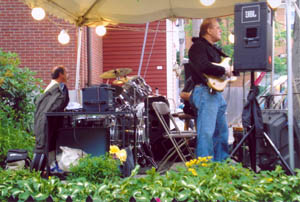 Musicians playing traditional Greek music (photo by Philip Lekousi) |
|
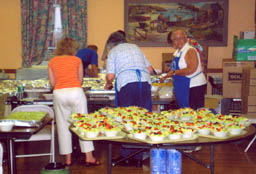 Ladies prepare foods for festival at adjoining Parish House (photo by Philip Lekousi). |
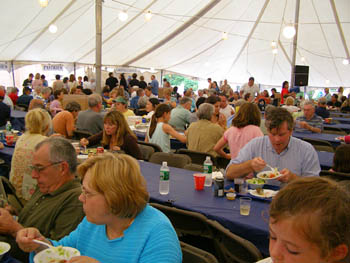 Under the tent at the opening of the festival. |
|
But the greatest draw at the festival clearly is the food and pastry. One need not have any prior experience with Greek cuisine to sample the home-made fare and appreciate the labor-intensive efforts that go into producing it. At this festival, unlike some in neighboring states, the foods are made entirely "from scratch." No dishes or pastries are purchased from national vendors. The ladies work in groups, generally baking one type of pastry at each session and repeating the process until they have baked the targeted amount. Quite often, final steps like steeping pastry in hot honey or syrup are postponed until just before the festival. Demand has always exceeded supply; every year the pastries sell out before the third day of the festival. The ladies try to increase the number of pastries they bake each year, but they find that they simply can't keep up with the demand. Patrons usually get another chance to purchase sweets, if they miss an opportunity at the festival: the ladies usually hold a pastry sale each November and accept advance phone orders. Best of all, however, is the fact that they have reprinted their cookbook, in response to repeated requests for recipes. Now in its fifth printing, this successful volume will be available shortly. HCS will soon post a release with details and ordering information for the book. |
||
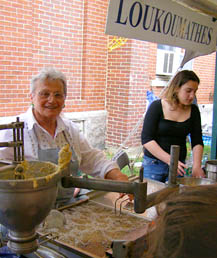 Festival volunteers Lefko Yiotis and Andrea Gribizes staff the Loukoumathes Booth |
|
|
| Rounding out the traditional Greek festival menu are other home-baked meals such as pastichio, moussaka, and spanakopita, as well as plates of Greek meatballs and stuffed grape leaves (dolmades). For the final course, there was a selection at the Holy Trinity festival of appetizing sweets: loukoumades (fried dough balls dipped in honey and served hot), baklava (layers of filo dough pastry buttered and covered with spice-and-nut filling), kourabiedes (powdered sugar topped butter cookies), koulourakia (buttered twist cookies), and more. Lines of patrons stretching more than a city block gave witness to the success of this annual festival with its traditional Greek cooking and festive atmosphere. To watch the expert grilling techniques of preparing shishkebab make plans now to attend next year's festival and watch the chefs on June 21-23, 2007. |
||
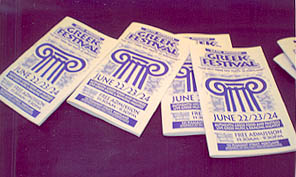 Colorful festival brochure. (Photo by Philip Lekousi) |
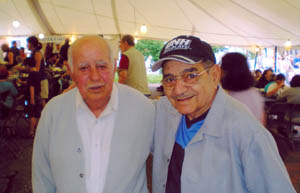 Community members Kosmas Kapiris (left) and George Lekousi (right) chat at festival and sample shishkebab. (Photo by Philip Lekousi) |
|
|
|
||
|
(Posting date 02 July 2006. Revision 16 August 2006.) For more information about the annual Greek festival at Holy Trinity Greek Orthodox Church in Portland, Maine, contact the church directly at 133 Pleasant Street, Portland, Maine 04101-3808; (phone) 207-774-0281; (email) htrinity@maine.rr.com or visit the church's website at the URL http://www.holytrinityportland.org. Holy Trinity falls within the see of the Greek Orthodox Metropolis of Boston and the larger Greek Orthodox Archdiocese of America. For more information about these jurisdictions, see their websites at the URL's: http://boston.goarch.org and http://www.goarch.org, respectively. HCS encourages readers to view other articles and releases in our permanent, extensive archives at the URL http://www.helleniccomserve.com/contents.html, especially those sections of our archives pertaining to the Metropolis of Boston and the Archdiocese of America. |
||
|
||
|
2000 © Hellenic Communication Service, L.L.C. All Rights Reserved.
http://www.HellenicComServe.com |
||
